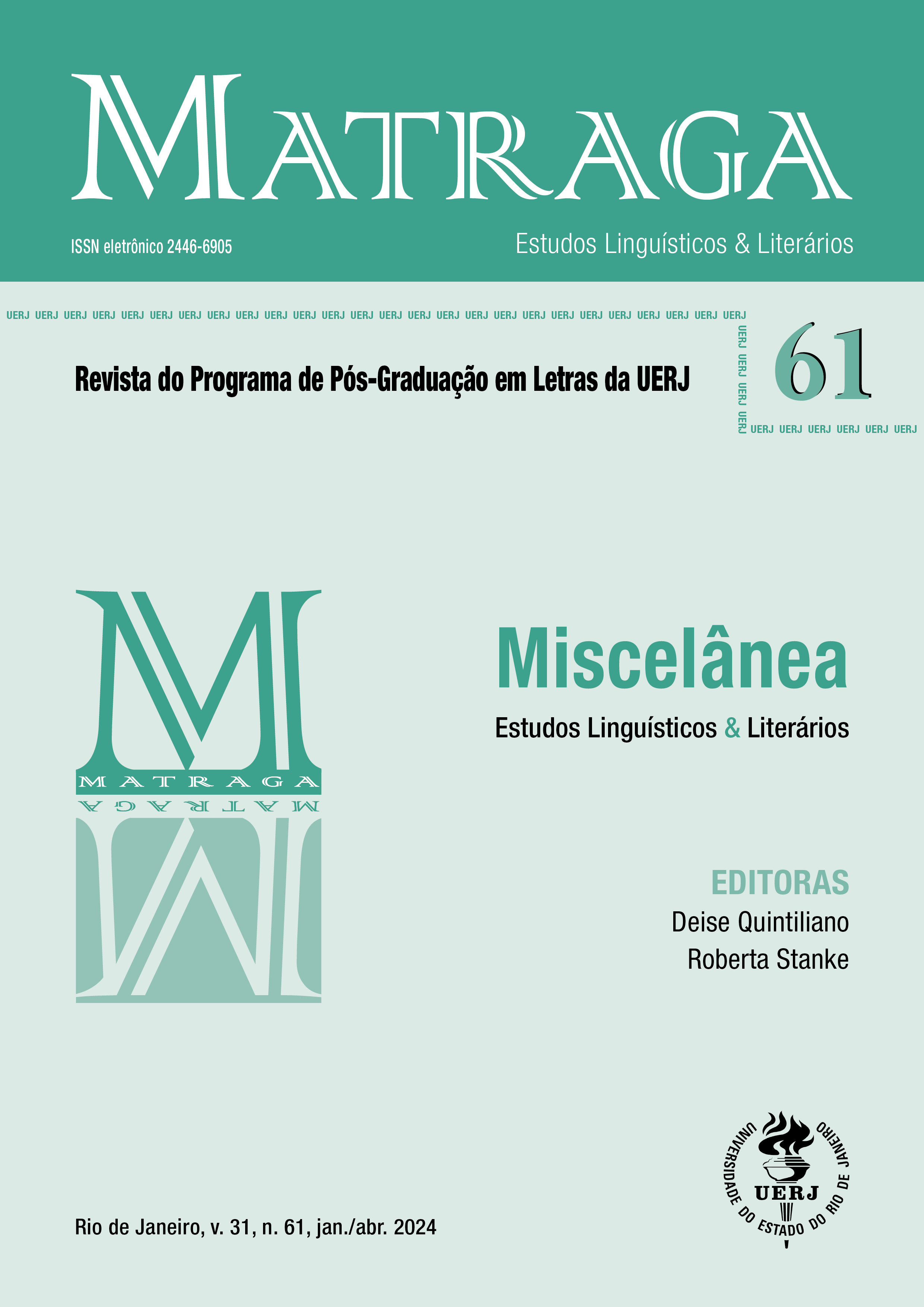A retórica amena de Alexandre de Gusmão (1629-1724, SJ)
DOI:
https://doi.org/10.12957/matraga.2024.77166Palavras-chave:
Alexandre de Gusmão, Companhia de Jesus, RetóricaResumo
Este artigo propõe uma investigação acerca da concepção de retórica para Alexandre de Gusmão (1629- 1724), padre que atuou à frente da Companhia de Jesus na América Portuguesa entre os séculos XVII e XVIII. Servirão de matéria a este artigo alguns dos escritos do jesuíta, conforme análise de passagens em que define sua noção de estilo, atrelada a virtudes teológicas e a efeitos letrados de humildade, simplicidade, sinceridade e verdade, conceituados em oposição a excessos elocutórios de “retórica humana”. Veremos que Gusmão, embora visasse a objetivos instrutivos, usava de retórica amena e deleitosa para promover o entendimento da doutrina católica pós-tridentina além-mar.
Downloads
Referências
BLUTEAU, Raphael. Vocabulario Portuguez & Latino: aulico, anatomico, architectonico. Coimbra: Collegio das Artes da Companhia de Jesu, 1712-1728. 8 v.
BOUZA, Fernando. Escribir a corazón abierto. Emoción, intención y expresión del ánimo en la escritura de los siglos XVI y XVII. Varia Historia, Belo Horizonte, v. 35, n. 68, p. 507-534, mai/ago 2019.
CARVALHO, Maria do Socorro Fernandes de. Poesia de Agudeza em Portugal. São Paulo: Humanitas; Edusp; Fapesp, 2007.
CASSIN, Barbara. O Efeito Sofístico: sofística, filosofia, literatura. Tradução de Ana Lúcia de Oliveira, Ma¬ria Cristina Franco Ferraz e Paulo Pinheiro. São Paulo: Editora 34, 2005.
COVARRUBIAS OROZCO, Sebastian de. Parte Primera del Tesoro de la Lengva Castellana; o Española. Madri: Por Melchor Sanchez, 1674.
GONÇALVES, Soraia Nascimento. Contributos para a Definição do Orador Ideal – Estudo e Tradução do “Orator” de Cícero. 362p. Dissertação (Mestrado em Estudos Clássicos) – Universidade de Lisboa, Lisboa, 2017.
GRACIÁN, Lorenço [Baltasar Gracián]. Agudeza y Arte de Ingenio. Huesca: por Juan Nogues, 1648.
GUSMÃO, Alexandre de. Arvore da Vida, Jesus Crucificado. Dedicada àSantissima Virgem Maria N. Sra. Dolorosa ao Péda Cruz. Lisboa Occidental: Officina de Bernardo da Costa de Carvalho, 1734.
GUSMÃO, Alexandre de. Eleyçam entre o Bem, & Mal Eterno. Lisboa Occidental: Officina da Musica, 1720.
GUSMÃO, Alexandre de. Escola de Bethlem, JESVS nascido no Presepio. Dedicado ao Patriarca S. Ioseph. Evora: Officina da Universidade, 1678.
GUSMÃO, Alexandre de. Historia do Predestinado Peregrino, e sev Irmão Precito: Em a qual debaxo de huma misteriosa Parabola se descreue o sucesso feliz, do que se ha de saluar, & a infeliz sorte, do que se ha de condenar. Lisboa: Officina de Miguel Deslandes, 1682.
GUSMÃO, Alexandre de. Meditaçoẽs para Todos os Dias da Semana, pelo Exercício das Tres Potencias da Alma, conforme ensina Sto Ignacio Fundador da Companhia de JESU. Lisboa: Officina de Miguel Deslandes, 1689.
GUSMÃO, Alexandre de. O Corvo, e a Pomba da Arca de Noéno Sentido Allegorico, e Moral. Lisboa Occidental: Officina de Bernardo da Costa, 1734.
HERMÓGENES. L’Art Rhétorique. Tradução de Michel Patillon. Lausanne: L’Age d’Homme, 1997.
HORÁCIO. Arte Poetica de Q. Horacio Flacco. Traduzida & illustrada em Portuguez por Candido Lusitano. Segunda Ediçaõ, Correcta, e emendada. Lisboa: Na Officina Rollandiana, 1778.
LICHTENSTEIN, Jacqueline. A Cor Eloquente. Tradução de Maria Elizabeth Chaves de Mello e Maria Hele¬na de Mello Rouanet. São Paulo: Siciliano, 1994.
LÓPEZ PINCIANO, Alonso. Philosophia Antigua Poetica. Madri: Por Thomas Iunti, 1596.
QUINTILIANO. Instituição Oratória. Tradução de Bruno Fregni Bassetto. Campinas: Editora da Unicamp, 2015, tomos I, II, III, IV.
SILVA, Isabel Scremin da. As Voltas do Compasso: um estudo retórico da obra espiritual de Alexandre de Gusmão. 2023. 320p. Dissertação (Mestrado em Literatura Portuguesa) – Universidade de São Paulo, São Paulo, 2023.
Downloads
Publicado
Como Citar
Edição
Seção
Licença

Este trabalho está licenciado sob uma licença Creative Commons Attribution-NonCommercial 4.0 International License.
AUTORIZAÇÃO
A Matraga – Revista do Programa de Pós-Graduação em Letras da UERJ está autorizada a publicar o artigo ora submetido, caso seja aceito para publicação online. Fica atestado que a contribuição é original, que não está sendo submetida a outro editor para publicação, e que a presente declaração é a expressão da verdade.
Os trabalhos publicados no espaço virtual da Matraga – Revista do Programa de Pós-Graduação em Letras da UERJ serão automaticamente cedidos, ficando os seus direitos autorais reservados à Matraga. Sua reprodução, total ou parcial, é condicionada à citação dos autores e dos dados da publicação.

A Matraga utiliza uma Licença Creative Commons - Atribuição-NãoComercial 4.0 Internacional.





